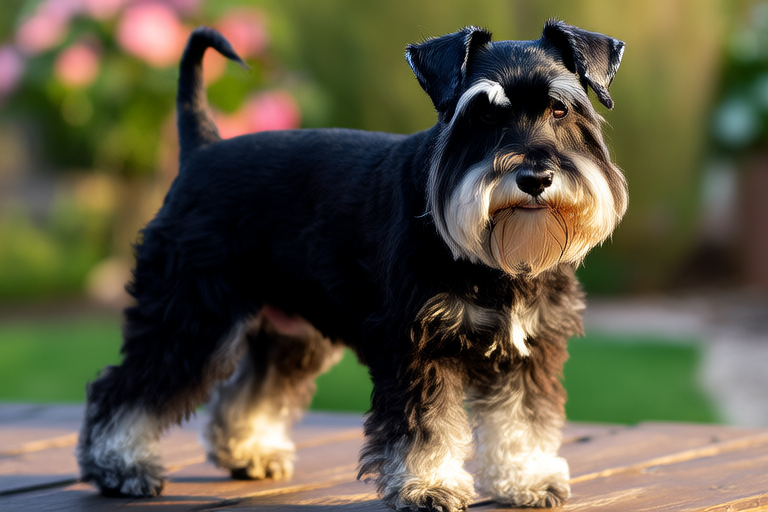The Intelligent Schnauzer: A Comprehensive Guide
The schnauzer is renowned for its intelligence and versatility, making it one of the most popular dog breeds across the globe. These dogs have been cherished by families for centuries, thanks to their sharp minds and friendly demeanor. In this guide, we will delve into the history of the schnauzer, explore their remarkable intelligence, and provide insights into their training, health, and care needs.
A Brief History of the Schnauzer
The schnauzer’s lineage traces back to Germany, where it was first bred as a rat hunter and guard dog. Over time, the breed evolved into three distinct sizes: standard, miniature, and giant. The standard schnauzer, being the original, was developed in the 15th century by crossing gray wolves with black poodles and wirehaired pinschers. This breeding resulted in a robust, versatile dog capable of handling various tasks.
Throughout history, schnauzers have served in numerous roles, from farm dogs to police and military service dogs. Their intelligence, loyalty, and strength made them valuable companions and workers. Today, they continue to excel in these areas while also thriving as loving family pets.
Three Key Traits That Make Schnauzers Smart
Problem-Solving Abilities
Schnauzers possess exceptional problem-solving skills, which set them apart from other breeds. They are naturally curious and enjoy figuring out puzzles and challenges. This trait makes them excellent at finding solutions to complex situations. For instance, if a schnauzer encounters an obstacle, such as a locked door or a high fence, it will likely attempt to find a way around it rather than giving up.
Trainability
Another hallmark of the schnauzer’s intelligence is its high level of trainability. These dogs are quick learners and eager to please their owners. With consistent positive reinforcement and clear communication, schnauzers can master a wide range of commands and tricks. Whether it’s basic obedience training or advanced agility courses, schnauzers excel in any environment where they can showcase their talents.
Adaptability
Schnauzers are incredibly adaptable, making them well-suited for life in various settings. Whether living in a small apartment or on a large farm, schnauzers can adjust to their surroundings and thrive. Their ability to adapt to different environments also extends to changes in routine or new experiences. This flexibility ensures that schnauzers remain calm and composed, even when faced with unexpected situations.
Tasks Schnauzers Can Easily Learn
Thanks to their intelligence and trainability, schnauzers can be taught a variety of tasks. Some common activities include:
- Basic obedience commands like sit, stay, come, and heel
- Agility training, including jumping over hurdles and navigating tunnels
- Assisting people with disabilities, such as guiding the visually impaired or alerting those with hearing impairments
- Participating in search and rescue operations due to their keen sense of smell and ability to follow scent trails
These tasks highlight the versatility of schnauzers and their potential to contribute positively to society. Their intelligence and willingness to learn make them ideal candidates for these roles.
Common Health Issues and Lifespan
While schnauzers are generally healthy dogs, they are prone to certain genetic conditions. Some common health issues include:
- Portosystemic shunt, a condition affecting liver function
- Bladder stones, which can cause urinary tract infections
- Allergies, particularly food allergies that may lead to skin irritation
- Eye problems, such as cataracts and progressive retinal atrophy
To help prevent these issues, regular veterinary check-ups, proper nutrition, and exercise are essential. On average, schnauzers live between 12 to 16 years, with some individuals reaching up to 20 years under optimal care.
Adoption Tips and Costs Involved
If you’re considering adopting a schnauzer, there are several factors to keep in mind. First, research reputable breeders or shelters to ensure you’re getting a healthy puppy from a responsible source. Next, prepare your home by creating a safe, comfortable space for your new companion. Finally, be prepared for the financial commitment involved in owning a schnauzer, including:
- Initial purchase cost, ranging from $500 to $2,000 depending on the breeder and location
- Regular veterinary visits, vaccinations, and spaying/neutering procedures
- Grooming expenses, as schnauzers require frequent brushing and professional grooming to maintain their coats
- Dog food, toys, and other supplies necessary for daily care
By carefully considering these factors, you can ensure a smooth transition for both you and your new schnauzer.
Why Schnauzers Are Ideal Pets for Active, Responsible Owners
In conclusion, schnauzers are ideal pets for active, responsible owners who appreciate a loyal, intelligent companion. Their problem-solving abilities, trainability, and adaptability make them excellent candidates for various roles, from family pets to working dogs. With proper care and attention, schnauzers can lead long, healthy lives filled with joy and purpose.
Whether you’re looking for a playful companion for your children or a reliable helper in your business, a schnauzer could be the perfect addition to your family. By understanding their unique needs and providing them with the love and attention they deserve, you can enjoy many years of companionship with this remarkable breed.
